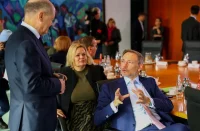The socio-political phenomenon of revolution in an individual country isn’t a new phenomenon in the modern era. The revolutionary wave hitting a number of countries is nothing new either. We might recall the events that shook Europe in 1848-1849 and the events of 1917-1918 that rocked the entire world. In this case, by “revolution” I mean “social revolutions,” i.e., broad social movements that change a socio-economic system (and its political superstructure), not the various revolts and coups that are only revolutionary in the minds of US State Department officials. If we approach the matter from the first point of view, another revolution (i.e., a change in the socio-economic system) hasn’t happened yet in the United States, but one could take place in the next decade.
What do I mean by the “another” revolution in the United States? Undoubtedly, the last one was Franklin D. Roosevelt’s reforms, which greatly elevated the role of government in the US economy. Those reforms were implemented without wholesale armed violence — but why does that matter? In principle, to make large-scale socio-economic changes it isn’t necessary to rip up cobblestones, run about the streets with a gun in hopes of shooting a policeman and write all sorts of nasty things on the walls of occupied government offices. The United States managed it without that kind of fun and games between 1933 and 1945. However, it couldn’t have done it without labor armies. What can you do? The path to becoming a real democracy is convoluted and complicated. It’s hard to say whether American society can avoid revolutionary excesses in the near future.
As far as the coming socio-economic changes in the United States are concerned, it has to be said bluntly that they’re long overdue, and the White House’s current attempts to resolve them through foreign expansion only aggravate the situation.
Be that as it may, all great historical phenomena have more than one cause. They’re driven by a wide range of socio-economic and political factors.
The revolutionary wave of 1989-1993 that swept the countries of the world socialist system didn’t derive solely from the Gorbachev couple’s desire to end communism once and for all or the desire of the CIA and Reagan personally to get rid of the Soviet military nightmare. That explanation would be too simple and incorrect. World socialism in the mid-1980s had clearly reached a dead end. Accept it. Simply and figuratively, there was too much socialism in Soviet-style socialism. That doesn’t mean the socio-economic system didn’t work, it just means there can be too much of a good thing.
There’s no need to prove that there is nothing fundamentally evil in the Anglo-Saxon economic model either (i.e., “capitalism”). The problem is that the model can also be taken to extremes. As an example, consider the current state of affairs in the United States and the EU, where there was so much capitalism that it simply moved to China, with its cheap and hardworking labor force.
Now, the revolutionary wave of 1989 has fizzled out completely. Everything that the revolutionary Moors needed to do has been done and even somewhat overdone. This year’s presidential election in Russia put an end to the matter once and for all, and no one but a fool, or the US ambassador to Russia, would fail to understand that — or would perhaps prefer not to understand it. Russian domestic politics have entered a counterrevolutionary phase, or, more precisely, a time for consolidating and evolving a new state with everything that entails, particularly stronger executive discipline and responsibility. In the 1990s, Russian society was in a state of near anarchy; a new socioeconomic order crystallized in the 2000s; and in this decade Russia is destined to recover some of what it lost, including on the international stage.
 Let’s turn to Russian Foreign Minister Sergey Lavrov’s March 14 speech in the State Duma and try to pick out a few fundamental points. First and foremost is the fact that “Russia must consolidate its position as one of the world’s leading states.” Another statement is also highly significant: “There is no reasonable alternative to pragmatic cooperation free of ideology and the intellectual inertia of the past.” What does Minister Lavrov mean by that?
Let’s turn to Russian Foreign Minister Sergey Lavrov’s March 14 speech in the State Duma and try to pick out a few fundamental points. First and foremost is the fact that “Russia must consolidate its position as one of the world’s leading states.” Another statement is also highly significant: “There is no reasonable alternative to pragmatic cooperation free of ideology and the intellectual inertia of the past.” What does Minister Lavrov mean by that?
As we know, after 1991 Russia (the Soviet Union’s successor) abandoned the pursuit of ideology-driven international diplomacy. In fact, it stopped aspiring to spread the revolutionary communist movement. Simply put, it gave up the idée fixe of “world revolution.” However, the Soviet Union, which was accused of all sorts of mortal sins after 1991, was not the only superpower (there was a total of two) to pursue ideological expansion on a large scale. At exactly the same time that the Bolsheviks in Russia were undertaking the great mission of liberating the proletariat throughout the world, US President Woodrow Wilson defined a number of global challenges for the United States that remain an important part of that country’s foreign policy to this day.
Woodrow Wilson declared that Divine Providence had given his country the mission to spread the American way of life and American ideals throughout the world. In 1919, he said, “We set this nation up to make men free, and we did not confine our conception and purpose to America, and now we will make men free. If we did not do that, all the fame of America would be gone and all her power would be dissipated.”
What, according to Wilson, awaited the countries and peoples that saw no need for liberation by the US government? In 1918 he set the United States the goal of destroying any despotic power, wherever it may be, that could independently, in secret and at its sole discretion disturb world peace; and if that could not be accomplished at the time, that power should at least be rendered utterly helpless.
Meanwhile, it has been 20 years since the Russian government abandoned efforts to impose communism on the entire world, and it seems to have no plans to again take up that godless enterprise. This can’t be said of the doctrine of Wilsonianism, which the US government is still following. It still has the goal of destroying any despotic power, wherever it may be, that could independently, in secret and at its sole discretion disturb world peace. In principle, that’s a noble goal. The problem is that the White House interprets the concept of “despotic power” very loosely and, for some reason, only as it supports its economic and foreign policy interests.
It should be noted that Western liberalism was a good thing when communism was its only rival. In those days, a few deviations from liberal holiness looked like necessary tactical moves in the overall strategic infallibility. Those tactical ploys were no longer justified after the collapse of communism, however, and they began to look like imperialism of the most heinous sort.
The current situation in the world looks a little strange. According to one view, there’s a powerful state in North America whose administration is convinced that it governs humanity — and that’s called a unipolar world. From a different standpoint, Washington aspires to run things, and most of the international community reacts with anger and doesn’t want to be mistreated. Whereas during the Soviet era the world was divided into two opposing teams and the third world was trying to choose between two evils, now it has no choice. The United States is evil, and that evil should be destroyed, however much Washington deceives itself.
Today, when the media discusses the idea of a multipolar world, many observers are slow to recognize that if the world is a jungle, a multi-polar world is a jungle where every monkey has a nuclear bomb.
I wonder, is that what the United States is striving for now?
It wasn’t by chance that in his pre-election article, “Russia and the Changing World,” Vladimir Putin wrote: “It seems that the more frequent cases of crude and even armed outside interference in the domestic affairs of countries may prompt authoritarian (and other) regimes to possess nuclear weapons. If I have the A-bomb in my pocket, nobody will touch me because it’s more trouble than it is worth. And those who don’t have the bomb might have to sit and wait for ‘humanitarian intervention.’”
What could bring that about?
 As Henry Kissinger said in the 1990s, “The issue is whether the post-Cold War world can find some principle to restrain the assertion of power and self-interest. Of course, in the end a balance of power always comes about de facto when several states interact. The question is whether the maintenance of the international system can turn into a conscious design, or whether it will grow out of a series of tests of strength.” The course of current political events (in Syria and Iran) indicates that finding a new balance in international relations will most likely follow the second scenario and will be propelled by the US government.
As Henry Kissinger said in the 1990s, “The issue is whether the post-Cold War world can find some principle to restrain the assertion of power and self-interest. Of course, in the end a balance of power always comes about de facto when several states interact. The question is whether the maintenance of the international system can turn into a conscious design, or whether it will grow out of a series of tests of strength.” The course of current political events (in Syria and Iran) indicates that finding a new balance in international relations will most likely follow the second scenario and will be propelled by the US government.
So, in his speech, Lavrov points to the following main elements that will contribute to a Russia that is stronger in the field of international relations.
First, the government of Russia’s newly elected president, Vladimir Putin, will continue enhancing the economic integration of the post-Soviet countries. That’s the reason for such supranational organizations as the Eurasian and Customs Unions. Of course, this doesn’t mean the Soviet Union will be reconstituted, but we should not fool ourselves into believing those organizations will be ineffective and poorly managed..
Second, Russia will strive to maintain the closest possible relations with the entity that currently is its chief trading partner, i.e., the EU, in which France and Germany play a leading role.
Third, Russia doesn’t intend to forgo its interests in relations with the United States. As Lavrov said, “Our fundamental condition is simple: If the United States intends to make no changes in its plans, let it provide dependable guarantees to us that the missile defense facilities deployed in Europe do not target Russia’s strategic nuclear forces… We do not reject dialogue. But if our partners continue ignoring our reasonable interests, Russia will have to take security countermeasures equivalent to the actions of the United States and NATO in the field of missile defense.”
Fourth, the Asia-Pacific region is becoming a key priority for Russian international politics. Lavrov said: “Today, the center of global economic activity is shifting to this region, and politics are close behind.”
Finally, Lavrov made another very interesting observation in his speech. “We will continue responding firmly to attempts to influence political processes in Russia, including by financing civic institutions for political purposes. I consider it necessary to make the Russian laws regulating such financing fully consistent with the US laws in this area.”
The Minister’s remark was undoubtedly somewhat droll or perhaps even mocking. Still, the issue is quite serious. Just the other day, on March 15, US Assistant Secretary of State for European and Eurasian Affairs Philip Gordon said the United States will continue to support democracy in Russia. “…With Russia we’ve been very clear about the importance of democracy, human rights, and civil society in our foreign policy. Since [Barack Obama became president in] 2009 we’ve [the administration] spent more than $200 million seeking to promote democracy, human rights and civil society in the recent elections,” Gordon said in a speech he gave in Washington. He also said the United States will continue funding Russian non-government organizations.
 To be open and honest, I am extremely angry at the Washington-backed NGOs in Russia. The reason is simple. I made a bet with someone just a month before Russia’s presidential elections. I bet that the so-called “swamp” opposition would at least make an attempt at a color revolution in Moscow. My betting partner argued that nothing of the sort would happen and the Russian revolutionary bubble would burst before reaching an appreciable size. As you know, dear reader, I lost the bet and suffered a serious blow to my pride.
To be open and honest, I am extremely angry at the Washington-backed NGOs in Russia. The reason is simple. I made a bet with someone just a month before Russia’s presidential elections. I bet that the so-called “swamp” opposition would at least make an attempt at a color revolution in Moscow. My betting partner argued that nothing of the sort would happen and the Russian revolutionary bubble would burst before reaching an appreciable size. As you know, dear reader, I lost the bet and suffered a serious blow to my pride.
I can say that now. If there is a standard of insignificance in modern political life, Russia’s “swamp” opposition certainly exemplifies it. Therefore, even if the US government allocates $200 billion instead of $200 million to support democracy in Russia, it will all be wasted on buying iPhones for human rights defenders and supporting their Chinese manufacturer, rather than on political upheaval, much less on promoting democracy.
Revolution in Russia is dead. Amen.
___________________________________
Konstantin Penzev is the Russian political analyst and historian.
Source: New Eastern Outlook














Anders Asplund, a neoliberal economist who lacks the basic equipment in terms of epistemological integrity, philosophical background and impartial propensity for serious analysis, let alone a talent for prognostics, said recently in one of his ad nauseam déjà vu interviews that Putin is not a person to be trusted and that he suffers from a paranoia towards America being as he is a former KGB officer, and so on and so forth…(http://ia600809.us.archive.org/13/items/WillPutinsAggressiveElectionDriveHamperTiesWithTheUnitedStates/pp20120222aslund.mp3)
Now, to judge from the most recent “report” made by Ambassador McFaul on “Russia after the Presidential Election: What It Means for the United States” at the Peterson Institute, on March 12, where he said that the US is going to invest more 50 million dollars in Russia in order to improve the resources for civil rights watch, then we must really believe that America is still obsessed by that wilsonian hubris and that the old record of meddling in another country`s affairs is not likely to end soon.The whole thing became so ingrained in their mindset that they thing it`s absolute normal to bypass diplomatic protocols. Here is just an extract of another recent interview of Ambassador McFaul given to Marc Werman : “I never had a Twitter account until I went to Russia. I think I’m up to 20,000 followers now. That gives me a direct way to communicate with Russian citizens in a way that does not have to be mediated through state television or otherwise. We got nothing to hide. Our policy is on the table. Our cards are down”. (http://www.theworld.org/2012/03/russia-ambassador-michael-mcfaul/).
Now imagine any country promoting that kind of “diplomatic ” activity in the US!
Pingback: Changing Political Regimes? – OrientalReview.org – DE LA GRANDE VADROUILLE A LA LONGUE MARGE